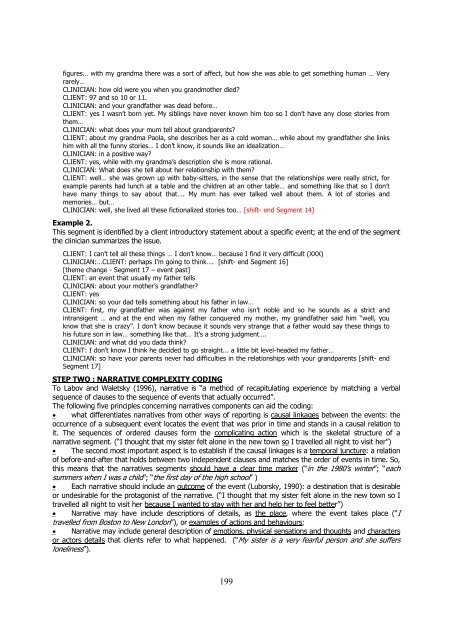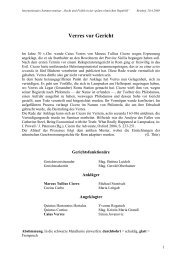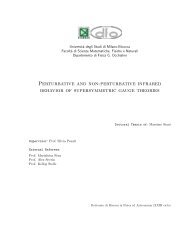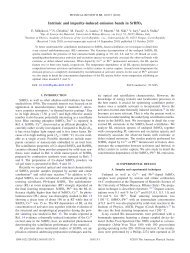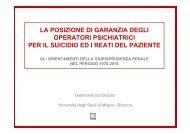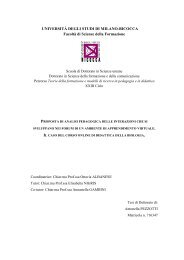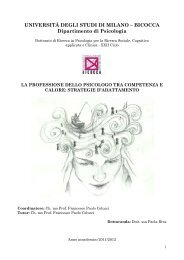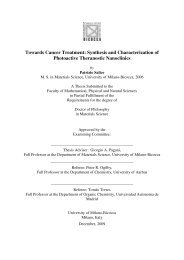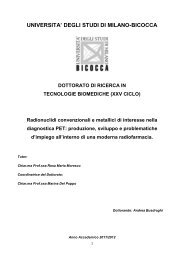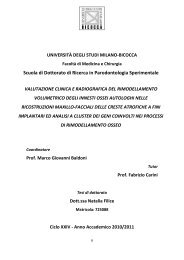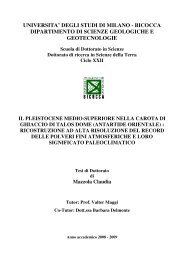LA NARRAZIONE AUTOBIOGRAFICA E IL FUNZIONAMENTO DEL SÉ
LA NARRAZIONE AUTOBIOGRAFICA E IL FUNZIONAMENTO DEL SÉ
LA NARRAZIONE AUTOBIOGRAFICA E IL FUNZIONAMENTO DEL SÉ
You also want an ePaper? Increase the reach of your titles
YUMPU automatically turns print PDFs into web optimized ePapers that Google loves.
figures… with my grandma there was a sort of affect, but how she was able to get something human … Very<br />
rarely…<br />
CLINICIAN: how old were you when you grandmother died?<br />
CLIENT: 97 and so 10 or 11.<br />
CLINICIAN: and your grandfather was dead before…<br />
CLIENT: yes I wasn’t born yet. My siblings have never known him too so I don’t have any close stories from<br />
them…<br />
CLINICIAN: what does your mum tell about grandparents?<br />
CLIENT: about my grandma Paola, she describes her as a cold woman… while about my grandfather she links<br />
him with all the funny stories… I don’t know, it sounds like an idealization…<br />
CLINICIAN: in a positive way?<br />
CLIENT: yes, while with my grandma’s description she is more rational.<br />
CLINICIAN: What does she tell about her relationship with them?<br />
CLIENT: well… she was grown up with baby-sitters, in the sense that the relationships were really strict, for<br />
example parents had lunch at a table and the children at an other table… and something like that so I don’t<br />
have many things to say about that…. My mum has ever talked well about them. A lot of stories and<br />
memories… but…<br />
CLINICIAN: well, she lived all these fictionalized stories too… [shift- end Segment 14]<br />
Example 2.<br />
This segment is identified by a client introductory statement about a specific event; at the end of the segment<br />
the clinician summarizes the issue.<br />
CLIENT: I can’t tell all these things … I don’t know… because I find it very difficult (XXX)<br />
CLINICIAN:…CLIENT: perhaps I’m going to think…. [shift- end Segment 16]<br />
[theme change - Segment 17 – event past]<br />
CLIENT: an event that usually my father tells<br />
CLINICIAN: about your mother’s grandfather?<br />
CLIENT: yes<br />
CLINICIAN: so your dad tells something about his father in law…<br />
CLIENT: first, my grandfather was against my father who isn’t noble and so he sounds as a strict and<br />
intransigent … and at the end when my father conquered my mother, my grandfather said him “well, you<br />
know that she is crazy”. I don’t know because it sounds very strange that a father would say these things to<br />
his future son in law… something like that… It’s a strong judgment….<br />
CLINICIAN: and what did you dada think?<br />
CLIENT: I don’t know I think he decided to go straight... a little bit level-headed my father…<br />
CLINICIAN: so have your parents never had difficulties in the relationships with your grandparents [shift- end<br />
Segment 17]<br />
STEP TWO : NARRATIVE COMPLEXITY CODING<br />
To Labov and Waletsky (1996), narrative is “a method of recapitulating experience by matching a verbal<br />
sequence of clauses to the sequence of events that actually occurred”.<br />
The following five principles concerning narratives components can aid the coding:<br />
• what differentiates narratives from other ways of reporting is causal linkages between the events: the<br />
occurrence of a subsequent event locates the event that was prior in time and stands in a causal relation to<br />
it. The sequences of ordered clauses form the complicating action which is the skeletal structure of a<br />
narrative segment. (“I thought that my sister felt alone in the new town so I travelled all night to visit her”)<br />
• The second most important aspect is to establish if the causal linkages is a temporal juncture: a relation<br />
of before-and-after that holds between two independent clauses and matches the order of events in time. So,<br />
this means that the narratives segments should have a clear time marker (“in the 1980’s winter”; “each<br />
summers when I was a child”; “the first day of the high school” )<br />
• Each narrative should include an outcome of the event (Luborsky, 1990): a destination that is desirable<br />
or undesirable for the protagonist of the narrative. (“I thought that my sister felt alone in the new town so I<br />
travelled all night to visit her because I wanted to stay with her and help her to feel better”)<br />
• Narrative may have include descriptions of details, as the place, where the event takes place (“I<br />
travelled from Boston to New London”), or examples of actions and behaviours;<br />
• Narrative may include general description of emotions, physical sensations and thoughts and characters<br />
or actors details that clients refer to what happened. (“My sister is a very fearful person and she suffers<br />
loneliness”).<br />
199


